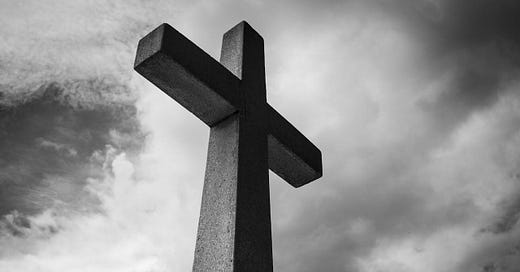Orthodox Christians sometimes accuse Protestants of Nestorianism because of how theologians like John Calvin speak of the cross. We instinctively want to say that only the humanity of Christ died on the cross because divinity is immortal by nature. And after all, if we say God died on the cross, we imply that the Father and Spirit died too—but that sounds too close to Modalism, a teaching that claims that the Father died on the cross because Father and Son are one subject.
Even so, Paul does say, "Pay careful attention to yourselves and to all the flock, in which the Holy Spirit has made you overseers, to care for the church of God, which he obtained with his own blood" (Acts 20:28). The phrase "his own blood" (τοῦ αἵματος τοῦ ἰδίου) refers back to God. Given this and other biblical passages, theologians like Cyril of Alexandria were bold to say that the Lord of Glory made human flesh his very own, and thus God the Son died.
The distinction of making flesh one's own matters. Nestorius taught that God was impassible (unable to suffer) by nature, and so what died at the cross was the man assumed by the impassible Logos. Cyril disagreed. If the Logos made flesh his very own, he experienced death precisely in that created flesh.
For this reason, the Son of God died on the cross according to his humanity because only the created flesh can decay and die while uncreated divinity lacks the capacity of death. God "alone has immortality" (1 Tim 6:16).
We can thus say God was crucified if by God we specify God the Son who alone took flesh to himself. Hence, Augustine can say, "God is rightly said to be crucified, not through the power of the divinity but through the weakness of the flesh." (Aug., De Trin. 1.12.28).
Yet the phrase "God was crucified" only makes sense if we understand that "He was crucified in the form of a slave and yet the Lord of glory was crucified, for such was that assumption that made God man and man God" (Aug., De Trin. 1.12.28).
Here, we see Augustine use the rule later codified in the Athanasian Creed:
"We have by this time become familiar with the rule according to which the sayings of Scripture about the Son of God are to be understood. And, therefore, we are able to distinguish what sounds in them according to the form of God in which He is equal to the Father, and what sounds in them according to the form of a slave, which He assumed and in which He is less than the Father. Thus we shall no longer be disturbed by sentences in the sacred books that apparently conflict with and contradict one another" (Aug., De Trin. 1.11.22)
In summary, we may say that God was crucified, even that God shed his blood, only when we speak of the flesh that God the Son made his very own.
Further Resources
“Divine Impassibility: Does God Feel Emotions Like We Do?” https://www.logos.com/grow/hall-divine-impassibility/
“Is the Father Greater than the Son?” https://ca.thegospelcoalition.org/columns/detrinitate/is-the-father-greater-than-the-son/
















Relating to your article on Augustine's inseparable operations.
What roles do we say that the Father and the Spirit have in Christ's death? Are they present in the Son on the cross, and also in us too (cf Jn 14.10, Jn 17.23, etc.)?
What does indivisibility, interpenetration, pericoheresis and coinherence have to say about each member of the Trinity's presence in the Son on the cross, and in the believer?